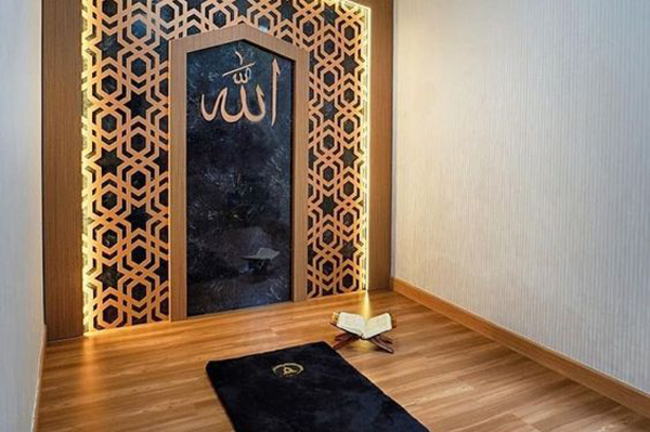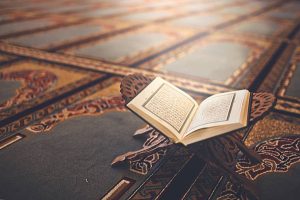
1. Commence the dua by praising Allah Ta‘ala and then reciting durood upon Hazrat Nabi (sallallahu ‘alaihi wasallam) . Thereafter, in all humility and respect, present your needs before Allah Ta‘ala.
عن فضالة بن عبيد قال: بينا رسول الله صلى الله عليه وسلم قاعد إذ دخل رجل فصلى فقال: اللهم اغفر لي وارحمني فقال رسول الله صلى الله عليه وسلم: عجلت أيها المصلي إذا صليت فقعدت فاحمد الله بما هو أهله وصل علي ثم ادعه قال: ثم صلى رجل آخر بعد ذلك فحمد الله وصلى على النبي صلى الله عليه وسلم فقال له النبي صلى الله عليه وسلم: أيها المصلي ادع تجب (سنن الترمذي، الرقم: ٣٤٧٦)[1]
Hazrat Fadhaalah bin Ubaid (radhiyallahu ‘anhu) reports that on one occasion, Hazrat Rasulullah (sallallahu ‘alaihi wasallam) was seated in the musjid when a person entered the musjid and performed salaah. He then made dua saying, “O Allah, forgive me and have mercy on me.” Rasulullah (sallallahu ‘alaihi wasallam) addressed him saying, “O musalli, you have hastened (in your dua). After performing salaah, when you sit (to engage in dua), then (first) praise Allah Ta‘ala with praises that befit His majesty and honour. Thereafter, recite durood upon me, and then call upon Allah Ta‘ala and ask Him of your needs.” Subsequently, Rasulullah (sallallahu ‘alaihi wasallam) had seen another person perform salaah. After performing salaah, he engaged in dua. He first praised Allah Ta‘ala and thereafter recited durood upon Rasulullah (sallallahu ‘alaihi wasallam). Rasulullah (sallallahu ‘alaihi wasallam) addressed him saying, “O musalli, call upon Allah Ta‘ala and ask Him for your needs, your dua will be answered (as you have abided by the etiquettes of dua).”
عن أبي عبيدة بن عبد الله عن أبيه قال: إذا أراد أحدكم أن يسأل فليبدأ بالمدحة والثناء على الله بما هو أهله ثم ليصل على النبي صلى الله عليه وسلم ثم ليسأل بعد فإنه أجدر أن ينجح (المعجم الكبير للطبراني، الرقم: ٨٧٨٠)[2]
Hazrat Abdullah bin Mas’ood (radhiyallahu ‘anhu) mentioned, “When any one of you wishes to supplicate before Allah Ta‘ala in dua, then he should begin by glorifying Allah Ta‘ala and praising Him with praises that befit His majesty and honour. Thereafter, he should recite durood upon Rasulullah (sallallahu ‘alaihi wasallam), after which he should beg Allah Ta‘ala and ask whatever he wishes. Certainly (by adhering to the etiquettes of dua) in this way, it is hoped that one will be successful (in getting his dua answered).”
2. When making dua, raise your hands parallel to your chest (i.e. in line with your chest).[3]
عن سلمان الفارسي عن النبي صلى الله عليه وسلم قال: إن الله حيي كريم يستحيي إذا رفع الرجل إليه يديه أن يردهما صفرا خائبتين (سنن الترمذي، الرقم: ٣٥٥٦)[4]
Hazrat Salmaan Faarsi (radhiyallahu ‘anhu) reports that Hazrat Rasulullah (sallallahu ‘alaihi wasallam) said, “Certainly Allah Ta‘ala is the most honourable and most kind and generous. His honour is such that He feels it against His greatness and mercy to let the one who raises his hands in dua to Him to go empty-handed.”
3. When raising your hands in dua, your palms should face upwards, towards the sky.[5]
عن شريح حدثنا أبو ظبية أن أبا بحرية السكوني حدثه عن مالك بن يسار السكوني ثم العوفي أن رسول الله صلى الله عليه وسلم قال: إذا سألتم الله فاسألوه ببطون أكفكم ولا تسألوه بظهورها (سنن أبي داود، الرقم: ١٤٨٦)[6]
Hazrat Maalik bin Yasaar (radhiyallahu ‘anhu) reports that Hazrat Rasulullah (sallallahu ‘alaihi wasallam) said, “When making dua to Allah Ta‘ala, then beg Him with your palms facing upwards (i.e. towards the sky). Do not face your palms downwards (i.e. towards the ground).”
4. Keep a slight gap between the palms.[7]
5. When making dua, express your total inability, helplessness and weakness, and beg Allah Ta‘ala in a soft tone with complete humility.
وَاذۡکُرۡ رَّبَّکَ فِیۡ نَفۡسِکَ تَضَرُّعًا وَّخِیۡفَة وَّدُوۡنَ الۡجَهرِ مِنَ الۡقَوۡلِ بِالۡغُدُوِّ وَالۡاٰصَالِ وَلَا تَکُنۡ مِّنَ الۡغٰفِلِیۡنَ ﴿۲۰۵﴾
And call upon your Rabb within yourself in humility and in fear without raising one’s voice in the mornings and the evenings. And do not be among the heedless.[8]
[1] وقال: هذا حديث حسن وقد رواه حيوة بن شريح عن أبي هانئ الخولاني
[2] وقال العلامة الهيثمي رحمه الله في مجمع الزوائد ١٥٥/١٠: ورجاله رجال الصحيح إلا أن أبا عبيدة لم يسمع من أبيه
[3] والمستحب أن يرفع يديه عند الدعاء بحذاء صدره كذا في القنية (الفتاوى الهندية ٥/٣١٨)
[4] وقال: هذا حديث حسن غريب
[5] في دعاء الرغبة يجعل بطون كفيه نحو السماء (الفتاوى الهندية ٥/٣١٨)
[6] وقال العلامة المنذري رحمه الله في مختصره ٤٣٠/١: قال أبو داود: قال سليمان بن عبد الحميد شيخ أبي داود: له عندنا صحبة يعني مالك بن يسار وفي نسخة: ما له عندنا صحبة وقال أبو القاسم البغوي: ولا أعلم
[7] والأفضل في الدعاء أن يبسط كفيه ويكون بينهما فرجة (الفتاوى الهندية ٥/٣١٨)
[8] سورة الأعراف: ٢٠٥
 Ihyaaud Deen An Effort to Revive Deen in Totality
Ihyaaud Deen An Effort to Revive Deen in Totality



